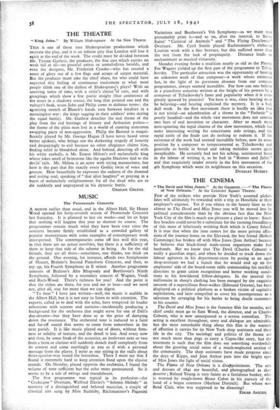MUSIC
The Promenade Concerts A MONTH earlier than usual, and in the Albert Hall, Sir Henry Wood opened his forty-seventh season of Promenade Concerts last Saturday. It is planned to last six weeks—and let us hope that nothing will happen this year to shorten its course. The programmes remain much what they have been ever since the concerts became firmly established as a crowded gallery bf popular masterpieces with some examples of contemporary work interspersed. The contemporaries come off less well this year, in that there are no actual novelties, but there is a sufficiency of them to keep that side of the scheme in being. As for the old friends, they are all there—sometimes, one thinks, too thick on the ground. One evening, for instance, affords two Symphonies of Mozart, Brahms's Second Pianoforte Concerto, and then, to top up, his Fourth Symphony in E minor. Another programme consists of Brahms's Alto Rhapsody and Beethoven's Ninth Symphony, followed by a secondary concert of Wagner, Verdi and Bach-Wood. There's richness for you! And the point is that the riches are there, for you and me to hear—and we need not, after all, stay for more than we can digest.
" To hear " I have just written—well, the music is audible in the Albert Hall, but it is not easy to listen to with attention. The experts, called in to deal with the echo, have tempered its louder reboations with screens and curtains—incidentally producing a background for the orchestra that might serve for one of Dali's day-dreams—but they have done so at the price of damping down the resonance. The orchestral tone is reduced to a faint and far-off sound that seems to come from somewhere in the next parish. It is like music played out of doors, without firm- ness or solidity of texture, and the detail is lost. And every now and then, by some freak of the acoustics, an irrelevant note or two from a horn or clarinet will suddenly detach itself completely from its context and come startlingly at you as if with a personal message from the player. I write as one sitting in the stalls about three-quarter-way round the horseshoe. There I must say that I found it extremely hard to keep attention fixed upon the elusive sounds. On Monday, placed opposite the orchestra, I found the volume of tone sufficient but the echo more pronounced. So it seems to be a tale of swings and roundabouts.
The first programme was typical in its profusion—the " Cockaigne " Overture, Walford Davies's " Solemn Melody " in memory of a distinguished and beloved musician, a couple of classical airs sung by Miss Suddaby, lrachmaninov's Paganini Variations and Beethoven's Vth Symphony—as we must now presumably print it—and so on, after the interval, to Saint- Saens' " Carnival of Animals " and " The Flying Dutchman" Overture. Mr. Cyril Smith played Rachmaninov's elaborate Lisztian work with a fine bravura, but this suffered more than the rest from the lack of propinquity. Distance lends no enchantment to musical virtuosity.
Monday evening broke a tradition nearly as old as the Proms, For Wagner yielded up the first part of the programme to Tchai- kovsky. The particular attraction was the opportunity of hearing an unknown work of that composer—a work whose existence has, in the light of its persistent absence from our concert- programmes, always seemed incredible. For how can one believe in a pianoforte concerto written at the height of his powers by a composer of Tchaikovsky's fame and popularity when it is com- pletely ignored by pianists? Yet here it was, since hearing must be believing—and hearing explained the mystery. It is a bad, dull work. In the first movement there is hardly an idea that is not trivial—an adumbration of a theme in the " Pathetic " is poorly handled—and the whole vast movement does not contain two bars of real invention or character. After so much mere note-spinning the tepid charms of the slow movement, which has some interesting writing for concertante solo strings, and the rapid rattle of the finale can do nothing to redeem it. If the existence of the work had seemed incredible before, now its com- position by a composer so temperamental as Tchaikovsky and generally so fertile in broad and taking melodies seems quite inexplicable. He certainly had not his aching, sentimental heart in the labour of writing it, as he had in " Romeo and Juliet" and that exquisitely tender: reverie in the first movement of the 4th Symphony which were its neighbours on this occasion.
DYNELEY HUSSEY.

























 Previous page
Previous page